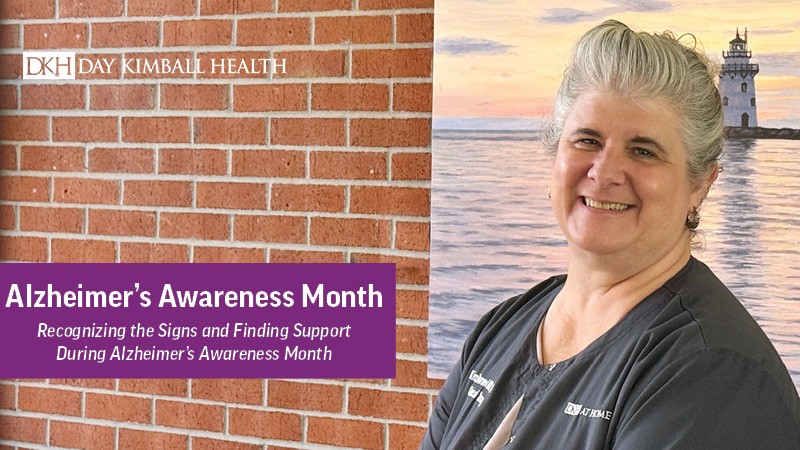
Recognizing the Signs and Finding Support During Alzheimer’s Awareness Month
09/19/2025Authored by: Kim Durand, RN
Hospice Program Manager, Day Kimball Health at Home
September is Alzheimer’s Awareness Month, a time to reflect on the impact of this disease and to share information that can help families recognize the signs, reduce risk, and find support. After many years of working with patients and caregivers, I have seen how important it is for families to understand the difference between normal age-related memory changes and something more serious.
The earliest signs of Alzheimer’s often begin long before families realize what is happening. I call this the “a-ha moment.” It is the point when memory or behavior changes noticeably from a person’s usual baseline. For example, someone who once excelled at balancing a checkbook can no longer manage it, or a person who never got lost while driving begins to miss familiar turns. These changes usually appear two to four years into the disease.
It is important to know that memory loss is not an automatic part of aging. Many older adults remain sharp well into their 90s and beyond. Alzheimer’s also does not only affect the elderly; individuals in their 40s and 50s can be diagnosed as well. Dementia itself is not a disease, but rather a symptom. Alzheimer’s is one of the most common causes of dementia, though strokes, infections such as Lyme disease, or other illnesses can cause it too.
While there is no cure, progress has been made in developing medications that can slow the progression when treatment begins early. That is why families who are concerned about memory changes should start with a visit to the primary care physician. Going to that appointment prepared, with a list of concerns and specific examples, is crucial. Doctors may need multiple visits to fully assess the situation because in short conversations, individuals can sometimes mask or minimize their symptoms.
Steps to Reduce Risk and Protect Brain Health
Although there is no single way to prevent Alzheimer’s, research shows that lifestyle choices can lower risk. Maintaining a healthy weight, managing diabetes, eating a balanced diet, exercising regularly, and getting seven to eight hours of sleep each night all support brain health. What benefits the heart often benefits the brain as well.
When a diagnosis is made, families face new challenges. One of the most important lessons for caregivers is to join the reality of their loved one rather than trying to correct them. Arguing or constantly reorienting only creates stress and anger. If a loved one believes something that is not accurate, it is better to gently redirect with a distraction or activity. This preserves dignity, reduces agitation, and helps keep the focus on safety and comfort.
Caregivers often struggle with how to respond when loved ones ask for parents or relatives who have long since passed. It may feel dishonest to avoid the truth, but repeatedly reminding someone of painful losses forces them to relive grief repeatedly. A gentler response, paired with reassurance, is far kinder in these moments.
Above all, caregivers must care for themselves as well. Supporting someone with Alzheimer’s is a 24/7 job, and it is often the hardest role they will ever have. Allowing time for rest, accepting help, and practicing self-forgiveness are essential. No caregiver is perfect, and every family has difficult days.
Finding Local Support
In partnership with the Alzheimer’s Association of Connecticut, Day Kimball Health offers programs designed to support families through education and connection. This collaboration shapes many of the resources we provide, including our monthly Alzheimer’s support group at the Brooklyn Senior Center, facilitated by professionals trained in dementia care.
During Alzheimer’s Awareness Month, my message to the community is simple: educate yourself and make a plan. Planning early while a loved one is still able to participate helps families prepare for what lies ahead. Most importantly, no one has to walk this path alone. There are resources and people ready to help, and support can make all the difference.

